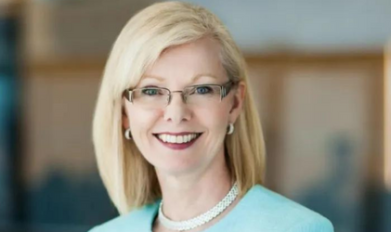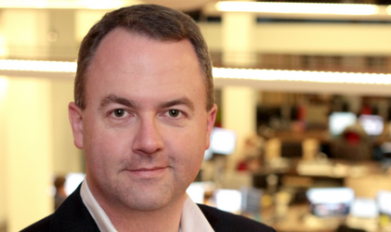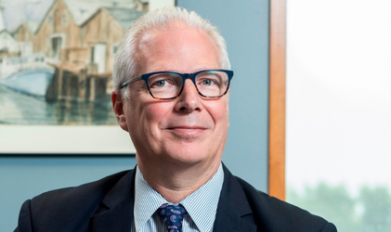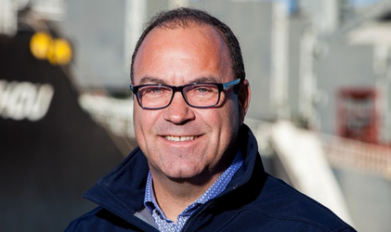A KBRS Partner interviewed Gina Pecore, CEO of Genoa Design, a Newfoundland-based organization providing detail design and 3D modeling services to shipbuilding and offshore industries in North America, in fall 2019. Together, they explore how Atlantic Canada can become more globally competitive and strengthen our economic outlook.
From her experiences with the Royal Canadian Navy to her track record of establishing and growing successful businesses, Pecore has a strong understanding of both the region’s entrepreneurial spirit and its shipbuilding legacy. She shares her thoughts on the advantages of being employee-owned, addresses the challenges of maintaining a corporate culture in a geographically dispersed organization, and how the next generation will shape the way we work.
What do you believe have been the most significant changes to the shipbuilding industry in Atlantic Canada in the past decade and how have these changes impacted the role of the industry in our economy?
Probably the most significant change to the industry is that we have one now. That wasn’t the case a decade ago. There was just hope for the resurgence of an industry that historically has been vibrant, most recently in the early 1990s during the Canadian Patrol Frigate Program. The fact that it has come back both directly through the region’s shipyards and indirectly through some of the other partners in the Canadian program has been very positive. For Genoa’s first two decades of operation, we had to go south of the border to get work, so we are happy to see this happening.
As for the impact on our economy, the answer is similar: years ago, shipbuilding stopped playing a role and it was missed. Building ships is at the heart of the marine economy, but oil and gas activity took its place for a while, bringing a vibrancy to Atlantic Canada’s economy that was needed. It’s exciting to see shipbuilding come back because it requires a whole new set of talent. More important, it is a financially lucrative sector because it creates opportunities for so many stakeholders. One of our partners estimates they work with more than 300 subcontractors in constructing ships. That’s a lot of work to go around, and the economic impact reverberates throughout our region.
Genoa has grown twentyfold in the past eight years. How has that impacted your talent requirements and what strategies are you using to ensure you keep pace with the growing demand for talent and innovative skills?
People often ask me how we have achieved that growth given that we exist in an island environment. But that has proven to be a benefit for us, particularly among Newfoundlanders who have gone out into the world. At some point, they want to come home, and I think the same is true for all Atlantic Canadians. People who were born and raised here seem to have a strong desire to come back and raise their own families. As a result, we’ve been successful in recruiting talent back to the region.
We’re also intentional in terms of how we develop our talent. We started a Genoa academy to help build soft, leadership, and technical skills quickly so we can accelerate the trajectory of our people and better enable them to serve our industry.
Retaining talent comes down to creating and maintaining a culture that appeals to people. That doesn’t mean we forego being competitive on compensation. However, we realized the importance of fostering an environment where people are eager to get to work each morning. That means providing people with choices in what they can do that go beyond their day-to-day responsibilities, and where they go next in their careers, whether that is in this or another industry. I think everyone wins when you have a culture like that.
Talent shortages have become a global issue, especially in the technology sector. Has having a great company culture helped with your recruitment efforts?
Because we are in a small economy population-wise, both provincially and regionally, we have a relatively limited pool of available candidates. We try to recruit locally, but it is tough to find talent. Often, we have contracted with partners like KBRS to help us suss out candidates and ensure we follow the right processes in making a hiring decision because the right fit is a critical part of keeping our culture vibrant as well.
You also have a unique culture in that Genoa is an employee-owned organization. How has that had an impact on your ability to attract and retain talented professionals?
We have been employee-owned for a long time, but it has been a relatively small group. There are really three primary owners who own most of the company. A few years ago we expanded that to six more key individuals, so it hasn’t been much of a recruitment tool to date. However, we have completed a further expansion of that program and, as of January 2020, every employee in the business can call themselves an owner, so there is a baseline of ownership.
That’s an amazing milestone.
It really is, and I think our ownership program will become a bigger part of our recruitment story, not because of the dividend cheque employees might receive but more because it gives them a say in our business. That is what attracts people, and we pride ourselves on creating an environment where employees are encouraged to speak up when they have an idea or see an opportunity for improvement.
We often hear from employees that this is not the case elsewhere, so it’s an empowering thing for them to join a company where they know that they have an ownership stake and an ability to make a difference, even if they are a brand-new graduate on their first job.
Do you find this culture and the benefits you offer—company lunches, flexibility—resonate more with people in junior positions versus your more senior team?
Not necessarily. For some of our junior people, this may be their first job, so this is the only culture they know. Most often it is the people who have had careers elsewhere who truly value our organizational culture. Being part of an environment that offers flexibility, and that values wellness and lifestyle balance, is something they appreciate, so it sometimes has more resonance with talent who have had long careers with other employers.
You have partnerships with clients in markets across North America, including New Orleans, British Columbia, and Newfoundland and Labrador. What challenges and opportunities have you experienced in leading an innovative, geographically dispersed team?
Culture is tough when you have multiple offices. We talk about it a lot because it’s vital to understand the elements that make up a viable organizational culture.
We are continually defining the Genoa culture—the things that must be standard across the company and the aspects that can be distinct based on office location. An across-the-board standard would be innovation—a dedication to learning more, doing things better, and being open to change. I would not say that there is a program that enables that to happen; I would say it is more a practice of constantly asking ourselves where we can make improvements and soliciting feedback on what we do. That dialogue piece, where you get inside the head of your employee or customer for their input, is the most important thing.
I’ll give you an example. In New Orleans, we completed a reboot of our office and we had a new employee come here to visit us for a week. He sat with me for an hour and spent time with my colleagues discussing everything from our organization to what he wanted to do. He said it was the first time in his career that a company was interested in hearing his thoughts, plans, and how he was going to integrate with the team.
He was expecting an orientation and not a dialogue, which is typical.
That’s right. But to come back to the original question: how do we maintain a connection across a network of partners? It’s pretty much the same way you do it with family in an empty nest situation. It takes ongoing communication, interest, inquiry, and action. I don’t want to sound like we have it all figured out because it is a point of concern for us to maintain that connection while ensuring our people have the liberty to do what they need to do in their regions. It’s complex, but it isn’t solved by saying ‘Here’s our innovation program, now go and apply it.’
Looking ahead, and taking all sectors into consideration, what do you predict will be the defining changes in Atlantic Canada’s workforce over the next five to 10 years?
For one, Generation Y will be in charge, which means more use of technology. They have grown up with it, so it is not an item on a checklist that needs to be figured out or learned. This knowledge is going to change the workforce in a positive way.
That marks a sharp contrast with how we previously implemented technology at Genoa. For example, there was a period when we had to monitor cellphone use and limit it. I knew it was a transitional measure. People were so tied to their mobile devices, and they still are, but now we can’t assume that it’s just personal use. Whether it’s the calculator function or an online search, I believe most employers today expect employees to have cell phones and use them in some way as a productivity enabler.
But that is the tip of the iceberg. There is new technology being adopted here at Genoa every day, and that has necessitated discussions at my level, as CEO, of “how do we keep up with technology and integrate it into the business”. I don’t think that will happen with the next leader. The struggles to integrate technology will disappear, enabling us to create human connections in more seamless, natural ways, which is what technology is all about.
You hire students and you do co-ops as well. Are you finding that Newfoundland and Labrador’s universities and colleges are teaching technology or is it something you have to teach them?
It is not a big enough priority here. I do hear great stories about initiatives that are happening in Atlantic Canada, and I know that our provincial institutions are trying hard to get up to speed, but we are not there yet.
That said, there were some fantastic things that were launched 20 years ago in Newfoundland and Labrador, such as Genesis, our province’s innovation hub, that recognized and encouraged people to think about the coming technology revolution. As a result, we have a vibrant tech industry, with incubators that are winning international awards and startups that are rapidly becoming successful exporters, which was the same for Genoa 20 years ago. This is very exciting. I don’t want to say our institutions aren’t doing the right things, because some great advances have been made. But when it comes to classroom instruction that prepares people to be part of the workforce of the next decade, we seem to be behind.
Given that change occurs much quicker in the corporate world than the academic world, do you have any concerns about the next generation replacing you and your generation?
I like to think there’s a place for me for a while yet, even as I approach the last phase of my career. Gen X, which is my generation, has wisdom and experience to offer organizations, but at the same time, our generation must be smart enough to move over so that new leaders can come in because they hold the promise of a new day.
About Atlantic Leader Insights
Atlantic Canada’s economy is fueled by a diverse array of private and public sector entities that employ thousands of people and contribute to our region’s growth and prosperity. But how are these organizations optimizing the potential of their people, and what insights have they gained about the future of our economy from their innovative initiatives?
KBRS recognizes the critical importance of attracting, developing, and retaining inspiring leaders and top talent within Atlantic Canada. We sat down with leaders at several high-impact Atlantic Canadian organizations to talk about our region’s opportunities and challenges. This article is one in a series that aims to collect these leaders’ insights on how we can enhance our economic outlook by strengthening our workforce.

CEO, Genoa Design, 2016 - Present



















